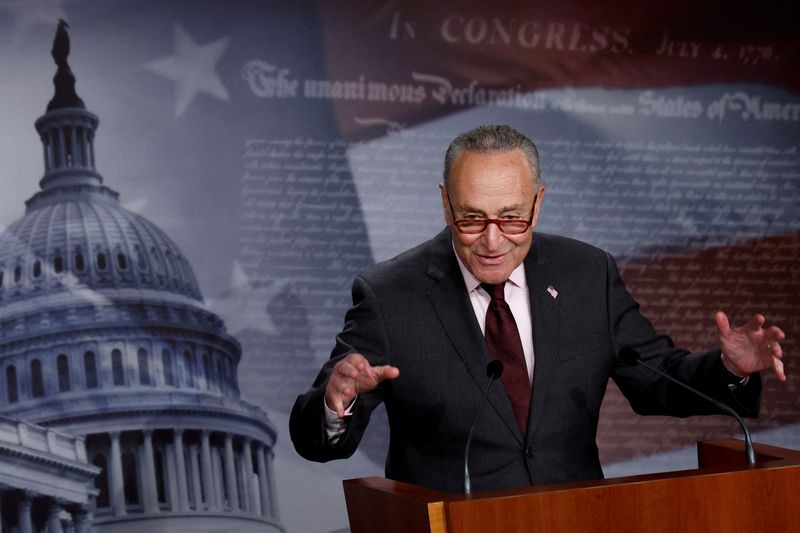By David Morgan
WASHINGTON (Reuters) - Democrats scored a major policy victory when the U.S. Senate passed a $430 billion climate change, healthcare and tax bill that will help reduce the carbon emissions that drive climate change while also cutting drug costs for the elderly.
President Joe Biden's congressional allies hope the bill, which they pushed through the Senate over united Republican opposition, will boost their chances in the Nov. 8 midterm elections, when Republicans are favored to recapture the majority in at least one chamber of Congress.
The package, called the Inflation Reduction Act, is a dramatically scaled-back version of a prior bill that was blocked by maverick Senate Democrats Joe Manchin and Kyrsten Sinema as too expensive.
"This is one of the most comprehensive and impactful bills Congress has seen in decades: it will reduce inflation, it will lower prescription drug costs, it will fight climate change, it will close tax loopholes, and it will reduce -- reduce -- the deficit," Senate Majority Leader Chuck Schumer said.
"For families struggling to pay the bills, for seniors struggling to pay for medications, for kids struggling with asthma. This bill is for them," he said.
The Senate's partisan 51-50 vote, with the tiebreaking vote coming from Vice President Kamala Harris, sends the legislation on to the Democratic-controlled House of Representatives, which is expected to pass it on Friday, after which Biden could sign it into law.
Republicans blasted the bill as a spending "wish list" that they argued would hurt an economy weighed down by inflation, saying it would kill jobs, raise energy costs and undermine growth at a time when the economy is facing a potential recession.
"Hundreds of billions of dollars in tax hikes on a struggling economy will kill American jobs," said top Senate Republican Mitch McConnell. He denounced the legislation as a "so-called inflation bill that will not meaningfully reduce inflation at all, and will actually make inflation even worse in the short term."
About half of Americans -- some 49% -- support the bill, including 69% of Democrats and 34% of Republicans, according to a Reuters/Ipsos poll conducted Aug. 3 and 4. The most popular element of the bill is giving Medicare the power to negotiate drug prices, which 71% of respondents support, including 68% of Republicans.
Economists, who say the legislation could help the Federal Reserve combat inflation, do not expect a sizeable impact on the economy in coming months.
CLIMATE FOCUS
With $370 billion in climate-focused spending, it would become the most consequential climate change bill ever passed by Congress.
The bill offers businesses and families billions in incentives to encourage purchases of electric vehicles and energy-efficient appliances, as well as to spur new investments in wind and solar power that would double the amount of new, clean electricity-generating capacity coming online in the United States by 2024, according to modeling by the Repeat Project at Princeton University.
That would help put the United States on course to meet its pledge to slash its greenhouse gas emissions in half by 2030 below 2005 levels, made at last year's Glasgow climate summit.
While environmental groups largely embraced the bill, they noted that compromises secured by Manchin, who represents coal-producing West Virginia, would prolong U.S. use of fossil fuels.
Those provisions include rules that would only allow the federal government to authorize new wind and solar energy developments on federal land when it is also auctioning rights to drill for oil and natural gas.
DRUG COSTS
The legislation would lower drug costs for the government, employers and patients, said Juliette Cubanski, deputy director of the Medicare program at the Kaiser Family Foundation.
"Perhaps the biggest effect would be for people with prescription drug coverage through Medicare," she said.
A key change is the provision allowing the federal Medicare health plan for older and disabled Americans to negotiate lower prescription drug prices.
The pharmaceutical industry says price negotiation would stifle innovation. Negotiated prices for 10 of the costliest drugs for Medicare would apply starting in 2026, with that number rising until it caps at 20 a year in 2029.
The nonpartisan Congressional Budget Office estimates Medicare would save $101.8 billion over 10 years by negotiating drug prices.
The provision also introduces a $2,000 annual cap on out-of-pocket costs for the elderly through the Medicare program.
TAX PROVISIONS
The bill also imposes a new excise tax on stock buybacks, a late change after Sinema raised objections over another provision that would have imposed new levies on carried interest, currently a tax loophole for hedge fund and private equity financiers. The provision was dropped.
The excise tax is expected to raise an additional $70 billion in tax revenue per year, lawmakers said. That is more than the carried interest provision had been forecast to raise.
A report by the nonpartisan Congressional Budget Office released prior to that last change estimated the measure would reduce the federal deficit by a net $101.5 billion over the next decade.
That was about one-third of the $300 billion in deficit reduction predicted by Senate Democrats, but excluded a projected $204 billion revenue gain from increased Internal Revenue Service enforcement.
